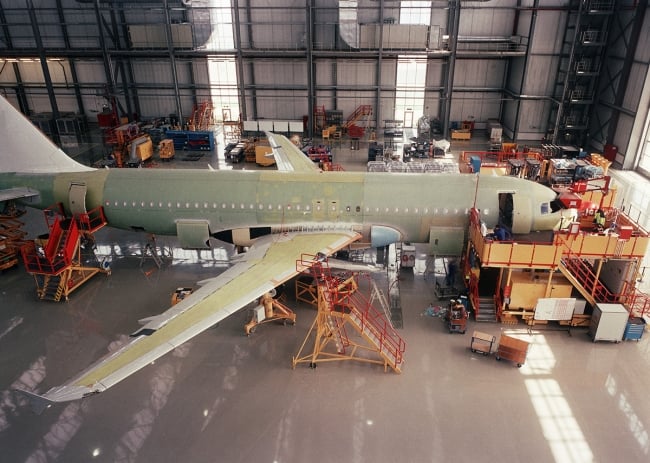You have /5 articles left.
Sign up for a free account or log in.

Talent Solutions Coalition
Like many sectors of the economy, the $70 billion aviation manufacturing and maintenance industry has a work force problem, with three-quarters of companies reporting a substantial shortage of skilled workers.
Colleges aren’t producing enough graduates who have the right certification and training, aviation companies say, or who are willing to move across state lines for a job, assuming they even know about openings outside their region.
“Everybody is trying to find people,” said Crystal Maguire, executive director of the Aviation Technician Education Council. “There are needs in areas that don’t necessarily have the supply. And there is supply in areas that don’t have the need.”
Enter the Talent Solutions Coalition, a newly formed nonprofit that seeks to be an employment broker that bridges the gap between colleges and aviation employers. Experts praise the experiment, saying it could be replicated in other industries if the group is successful.
The four participating institutions so far are Wichita Area Technical College, in Kansas; Arizona’s Pima Community College; Vincennes University, a four-year, public institution based in Indiana; and Tulsa Community College, in Oklahoma.
Here’s how the coalition is designed to work.
A regional airline might tell the group it needs to hire 150 skilled workers within two years. The coalition, which is based at Wichita Area Technical College’s National Center for Aviation Training, would then work with its college partners to train 150 students through a specialized, in-person certificate or degree program. That could mean divvying up the slots, with three colleges each taking 50.
Curricula will be tailored to employers’ needs, said Vincennes President Chuck Johnson, with a focus on hands-on experience that is relevant to the work.
The partnerships will lead to some standardization across colleges, Johnson said, and will “have at least a core set of competencies and outcomes.”
Sometimes the hiring pathways will cross state lines. That’s unusual for public institutions, particularly community colleges, which typically don’t plan to train students for jobs in other states or regions.
“It’s bringing together education, business and industry to really solve a national problem,” said Sheree Utash, president of Wichita Area Technical College. “It creates a network.”
The coalition will serve as a “hub for talent acquisition,” she said, and as a “one stop for employers.”
Going National
Most of the job-market benefits of participating will be local, said several officials at participating colleges. But graduates who leave the area also will benefit.
Students who earn credentials through the coalition will have a job waiting for them. And annual salaries often start at $50,000-60,000 for entry-level technicians in aviation, with overtime typically boosting pay.
More than 90 percent of students who complete aviation programs at Pima stay near Tucson, where there are plenty of jobs in the industry, said Ian Roark, vice president of work force development for the community college. But he cited hiring shortages for well-paying aviation jobs both around Tucson and beyond.
“The labor market’s already national,” he said. “The shortage that we’re experiencing regionally is ubiquitous nationally.”
Even so, employers often struggle to get the word out to students about those jobs, said Tim Welsh, the coalition’s executive director. Students typically have outdated views about the industry, thinking about riveters rather than robotics, he said. And the companies’ hiring needs extend beyond technicians to supervisory roles.
Welsh’s group is seeking to connect companies with marketing departments at participating colleges to help them get more information about the aviation career path to students and faculty members.
“This is putting pressure on the employers to get better about telling people why they should come work with them,” he said.
Welsh said the coalition, in its role of “standing up the supply chain,” also plans to help colleges and employers assess the job readiness of students. That means conducting tests aimed at measuring both technical and soft skills, like work ethic. And some of those assessments could be used to issue certifications.
For example, the coalition plans to offer certifications from SpaceTEC, a nonprofit that receives funding from the National Science Foundation and conducts third-party assessments.
The combination of a recognized certification from SpaceTEC with academic training courses that are tailored to aviation manufacturers would be particularly valuable to employers, said Michael McDaniel, general manager of maintenance training for ExpressJet, an Atlanta-based airline.
One problem it might help fix, McDaniel said, is that many colleges’ aviation programs are designed around the Federal Aviation Administration’s relatively minimal licensing requirements, which have not been updated in decades.
“We are struggling to hire and maintain an educated work force,” he said. “The level of training they set is not adequate for our needs.”
As a result, ExpressJet spends time and money training new hires. It can take more than two years to get college-trained employees up to speed, said McDaniel. And bigger airlines often poach workers ExpressJet trains.
The coalition offers a more efficient hiring pathway, he said, by seeking to send to ExpressJet graduates who are well trained, familiar with the companies’ processes and holding a certificate from SpaceTEC.
“You’ve just completed three to six months of your training here,” he says of graduates who will complete the program. “That person’s value suddenly increases within the industry.”
Outgrowth of Federal Grant
The coalition grew directly out of a federal grant program with an exceptionally long name (and acronym): the Trade Adjustment Assistance Community College and Career Training program (TAACCCT).
With $2 billion in funding, the grant program backed projects at community colleges that were aimed at encouraging closer coordination with employers. The money went to coalitions of two-year colleges, often from disparate regions of the country, and was intended to create projects that would outlast the federal money.
Those lofty goals weren't always realized. But the Talent Skills Coalition appears to have done exactly what the Obama administration intended with the grants, said Mary Alice McCarthy, a former official at the U.S. Departments of Labor and Education, who is now director of the Center on Education and Skills with the education policy program at New America.
Wichita Area Technical managed one of the grants from 2012 until last October, when the funding expired. The goal of that project, which included Tulsa Community College, was to promote careers in aviation manufacturing. When asked by the college, employers reported that their need for the collaboration remained, Welsh said, with plenty of shortages in well-trained hires. That research was used to create the coalition’s business plan.
Employers are the nonprofit’s primary financial sponsors, according to Welsh. And the coalition has three tiers of relatively low-cost membership fees for colleges to participate.
McCarthy called the partnership a “great outcome of the TAACCCT grants,” which appears to be one of several fledgling efforts to create an “intermediary market that is really connecting education providers with jobs.”
Jason Tyszko agreed. Tyszko, executive director of the Center for Education and Workforce at the U.S. Chamber of Commerce Foundation, praised the coalition’s supply-chain approach and the fact that it stretches across state lines.
“They recognize that labor is mobile,” he said. “Whether the states recognize that is an open question.”
So far, though, college officials sound confident that the model will be viewed as a win-win by colleges and policy makers.
Roark said he expects the coalition to contribute to Pima’s growth in aviation programs, with the partnerships bringing in both more employers and students. The goal, he said, is to “empower our clients, our students, with more information about the labor market.”
For his part, Welsh said, attention to the national hiring pipeline need not be a departure from the mission of community colleges.
“It’s just a new definition of the word ‘community,’” he said.




